The Paul Noonan (Bell X1) Interview
RSL INTERVIEW SERIES: Ireland's Bell X1 have been one of the busiest bands on the globe the last few years. Since their last full-length album, Flock, they have traveled extensively on a furious tour schedule that has seen them play shows on both sides of the Atlantic. A new album set for a March 3rd release will place them, again, in the limelight!
BELL X1
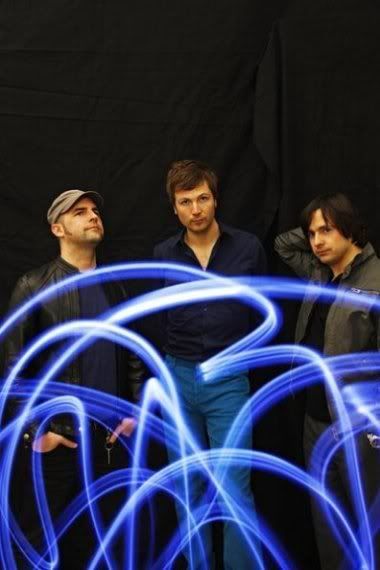
Dave Geraghty, Paul Noonan & Dominic Phillips

Dave Geraghty, Paul Noonan & Dominic Phillips
TOURING & NEW ALBUM: A recent, nationally-televised appearances on Letterman has earned the band even more attention. The band has even undergone some lineup changes - all in an attempt to perfect their sound for their latest album: Blue Lights on the Runway, a record that recalls Eno-era Talking Heads, Sigur Ros, and XTC, amongst others. The band's central trio of Paul Noonan, Dave Geraghty, and Dominic Phillips penned every song on the record.
I prepared for my interview with X1 singer Paul Noonan by listening to our review copy of the new album. It's safe to conclude Blue Lights will draw the band a whole new audience of devotees. Tracks like “The Great Defector” are fun and approachable, and others, like closing song “The Curtains are Twitchin’” show Bell X1 are worthy comparison to peers like The Frames.
I prepared for my interview with X1 singer Paul Noonan by listening to our review copy of the new album. It's safe to conclude Blue Lights will draw the band a whole new audience of devotees. Tracks like “The Great Defector” are fun and approachable, and others, like closing song “The Curtains are Twitchin’” show Bell X1 are worthy comparison to peers like The Frames.
I caught up with Paul recently in Los Angeles where the band was again on tour. I would soon learn "Blue Lights on the Runway" was born of "draughty old Irish castles" and "Eastern European getaways."
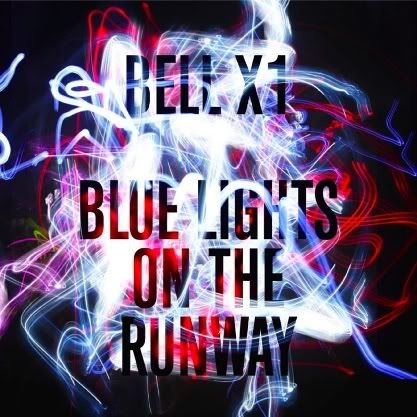
Available March 3
NICK PARKER of RSL: Thanks for the opportunity Paul. I wanted to start out by asking about recording the new album, [“Blue lights on the runway.”]. How much involvement do you have in the recording process? Are you really hands on with that stuff?
PAUL: I think we’d be pretty hands on at this stage. This is the first album that is ‘our record’ – we fully own it – and we’ve got lots of studio gear that we’ve amassed over the years, and we tend to just find a nice space to put it up in. We’ve done the last two records that way.
RSL: So effectively you’ve produced the album yourself?
PAUL: Yes, well our good friend Bill Hayes has been involved in the last two records. I wouldn’t be too au fait with the technical aspects, but Dave [Geraghty] is good at that.
RSL: You recorded in Dublin, yes?
PAUL: Well, we found a castle in the middle of Ireland. It had these great big drafty rooms with high ceilings – really for lords and ladies. There’s all this really characterful old stately homes that are very cold, but have great acoustics.
RSL: Was Blue Lights on the Runway recorded all in one place?
PAUL: Yes. We try to keep going until we have to stop, so we did maybe a month of recording in the house and then, between all the bouts of touring we did last year, we’d take some time and maybe use people’s houses to finish things up.
RSL: It seems like it’s becoming more and more rare these days to record everything in one place.
PAUL: That seems to be the way things are going as the recording process has evolved.
RSL: Do you think it affects the project a lot, whether you record in one place or many?
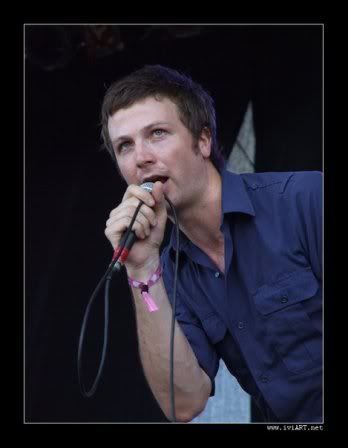
Paul Noonan
photo by Ivi Rebova
PAUL: Yes, I think often you can overwork things as a result of meddling, as opposed to the recording needing that work. We did a session the other day with Steve Lilywhite in New York, and he was very much of the opinion that you should come into a proper studio, having rehearsed a shit-load, and having a pretty good idea of where you’re going. He put forward the somewhat controversial hypothesis that Sergeant Pepper… being the first high profile band who really didn’t know what they were going to do until they got in the studio, and then they used the studio as an instrument… that Sergeant Pepper killed music, which I think is being willfully controversial…
RSL: That is a pretty extreme perspective!
PAUL: Yeah, you can be wonderfully creative by looking at it that way too.
RSL: One track I really liked was “The Great defector” - it seems to me to have a lot of Talking Heads in it? Are they a big influence of yours?
PAUL: Yes, they would be. We may have gone a bit far with that one! But yes, when I first saw the video to Road to Nowhere, as a young kid, the physical comedy, as well as the visual aspect, appeals to people of a really young age. I suppose only in the last few years have I gone back and listened to their earlier records and loved them.
RSL: So you’d say they were a major influence then?
PAUL: They have been. I remember when we were making our second record [Music in Mouth] in 2002 in Chiswick, London, and we’d go back from the studio to our flat each night and one of the guys would put on their album “Fear of Music,” which I had never heard, and was a really joyous thing to hear when you’re in the throws of a creative process. It was a real inspiration.
RSL: Yes, there’s that great track – if I recall correctly – “American Guitars” or “Electric Guitars”…
PAUL: Yes, “Electric Guitars” is a great one.
RSL: So, given this big influence from an American Band, would you say you would have more roots in Irish or American music?
PAUL: Well, I don’t really think of us as an Irish band, whatever that means…
RSL: I mean, is there a big difference between music from the two places still, do you think?
PAUL: Yeah, Ireland has a bunch of very strong singer-songwriters, because the oral tradition in Ireland gives it that strength. You grow up [in Ireland] in a culture of storytelling, and playfulness with language, and I think that makes a big difference to the music scene. But I don’t think of us as particularly from that world, although being Irish does have a big influence on my writing.
RSL: The drums parts and synths in songs like “How your heart is wired” have some 80s overtones.
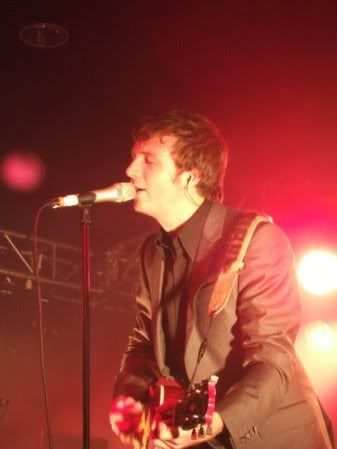
Paul Noonan
photo by Maj Britt
PAUL: We’re not exactly re-inventing the wheel with that, but we did have a lot of fun playing with synths and drum loops. I suppose I wanted to take tracks that we would have written in a more tradition way – on acoustic guitar or on piano – say Dave and I, at each other’s houses, and then take those songs and dress them in beats, etc. so they’d sound a little more fresh, but not change the backbone of the song.
RSL: So do you think that’s coming out of some older musical interests, or is it resurgent right now in general?
PAUL: I think it comes out of an appreciation for older bands. We are big fans of Depeche Mode, and we learnt a couple of their songs to play acoustically, and we discovered that their was great writing there – songs that would stand up with a single voice and acoustic guitar. We really like New Order as well, on the strength of their songs.
RSL: Could you talk a little bit about your creative process, since you seem to have so many roles in the band! How do things usually get started?
PAUL: There’s no real formula for it. In the past when we’ve landed on something that works and then tried it again, it doesn’t, which I suppose is one of the beauties of music. This time around I spent some time alone in Eastern Europe writing, and learning the more computer based ways of producing songs, so a lot of the initial writing was done like that. With the last record we were in a position to start songs with the four us [together], from scratch, but this time the songs were pretty well formed before we all got together.
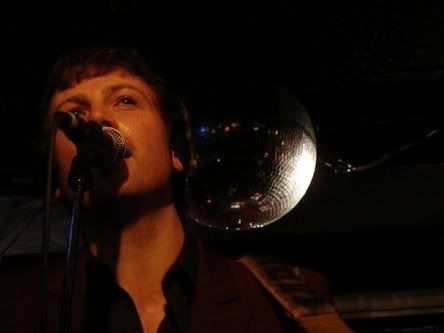
Paul Noonan
photo by Sharim Rahman
RSL: So the Eastern European trip you did, was that specifically to write, or were you there for other reasons?
PAUL: It was just to get and away and write. In Dublin there are too many distractions!
RSL: I understand you still do the drumming when you’re in the studio – is that right?
PAUL: This is actually the first one I haven’t done. Tim O’Donovan, who’s been playing with us live for year did them this time.
RSL: So does that imply your moving to ‘fronting’ the band more? How does it feel when you go back to that instrument [the drums]?
PAUL: I really enjoy it. I miss it when I don’t do it. I try to get out once or twice a year and tour as a drummer with other bands. But we don’t really have that sharply defined roles within Bell X1 – we move from instrument to instrument. I enjoy not playing drums while recording all the time. I enjoy the freedom of being able to sing properly. I don’t see that as a new role for me really. Bringing Tim in to play drums gave us an injection of his energy and his feel for things. It’s quite a rhythmically driven record and we talked a lot about that, and he [Tim] has his own style which was a great thing to capture.
RSL: You’ve toured with The Frames in the past. I wondered what your thoughts were about the effect of the popularity of The Swell Season, and the film Once, on the Irish music scene? Is the scene really thriving right now?
PAUL: I don’t really know. I think for a long time the term Dublin band was a derogatory one, associated with a sort of blusterous pub-rock. I don’t think that’s any longer the case – that stereotype doesn’t ring true. I mean, there’s great electronic music in Dublin, there’s good, straight ahead three piece rock bands, there’s even some good hip-hop. It is pretty diverse. The singer-songwriter scene is still very strong, and some of that is the result of once. Glen [Hansard] is such an established singer-songwriter, and he’s connected to so many different eras of the singer-songwriter. That fact that he’s achieved this recognition, it pulls everybody up. It re-enforces the idea of quality song-writing from Ireland.
RSL: Thanks for you time, and good luck with the tour. I’m hoping to be at the Boston show myself.
PAUL: I’m sure it will be a messy affair, but we’ll try to keep order!
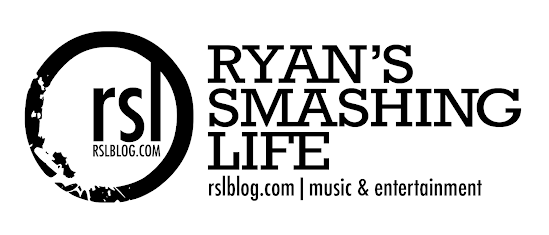
Comments